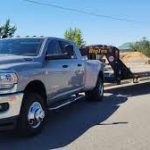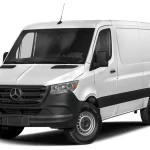What’s a Commercial Vehicle?
One definiton of a commercial vehicle is simply a motor vehicle used for business rather than personal or family use.
Commercial vehicles that are used for transporting goods for hire are regulated by both federal and local laws.
The true definition of a commercial vehicle can be confusing because of FMCSA requirements and Insurance Broker Underwriting.
Trucking for Hire
Trucking for hire, also known as for-hire trucking or contract trucking, refers to the transportation of goods by truck for a fee.
The trucking company is not affiliated with the company whose goods are being transported.
It’s essentially a service where businesses or individuals can hire trucks and drivers to handle specific transportation needs.
Some examples of for-hire trucking include:
- Freight Hauling – both long haul (across state lines or Interstate) and short haul (within a local area or region or Intrastate)
- Less than Truckload (LTL) – combining shipments of multiple clients on one truck
- Full Truckload (FTL) – a single client shipload for larger shipments
- Expedited Shipping – faster delivery for urgent shipments usually Interstate
- Last Mile Delivery – faster delivery typically Intrastate
Trucking for Hire Questions
The Federal Motor Carrier Safety Administration (FMCSA) and your insurance broker get questions every day on the definition of a commercial vehicle.
- Why is my Truck considered a commercial vehicle?
- Is a PickUp Truck a commercial vehicle?
- Is a HotShot Truck a commercial vehicle?
- Is a Cargo Van or Sprinter a commercial vehicle?
- Is a Ford Transit a commercial vehicle?
- Is a Box Truck a commercial vehicle?
- Do I need a DOT for my commercial vehicle?
- Do I have to register my truck as a commercial vehicle in my state?
Why is my Truck considered a Commercial Vehicle?
The Federal Government has a tighter definition of a Commercial Vehicle than your Insurance Broker:
FMCSA definition of a Commercial Motor Vehicle
FMCSA regulates that a unit is defined as a Commercial Motor Vehicle (CMV) if the gross vehicle weight or
combined weight of truck and trailer is over 10,001 pounds and is used to transport property for hire across state lines.
Insurance Broker’s Definition of What is a Commercial Vehicle
Any vehicle used for business purposes is considered a commercial vehicle
Is a PickUp Truck or HotShot Truck a Commercial Vehicle?
A typical pickup truck is well under 10,001 GVW. For example, a Ford F-150 is 4,021 to 5,740 lbs.
Most basic pickup trucks are not used to haul freight for hire across state lines, and FMCSA does not define them as commercial motor vehicles.
Your insurance broker will assist you in determining whether you’re using your pickup truck for mostly personal or business purposes.
However, an Ford F-150 DUALLY weighs in at 6,764 lbs. A Dually is a heavier pick up truck with dual rear wheels on either side.
This type of truck is often referred to as a one ton pickup.
A Hotshot Truck is a Dually with a trailer hauling freight for hire. Typical loads for a HotShot Truck include heavy machinery and farm equipment or toys like motorcycles, boats, golf carts, RVs and trailers. They can also haul 2,000 lbs in their truckbed.

It’s easy to see how a HotShot Dually and Trailer quickly surpass 10,001 GVW.
To haul freight across state lines, FMCSA requires you to obtain your own operating authority (DOT) and
a minimum of $750,000 Commercial Auto Liability insurance.
Your professional truck insurance broker will help you navigate FMCSA, and get you what you need for HotShot Insurance.
Is a Cargo Van or Sprinter a Commercial Vehicle?
Commercial Vans are often used in the niche of trucking called Expediting.
HotShot and Expediting operations are similar because both haul freight for hire on a time sensitive nature.
Both Expediters and HotShots also tend to operate between 300 and unlimited miles.
But the expediter drives a cargo van or sprinter while the hotshot drives a dually.
[Related story – HotShot Insurance vs Expediter Insurance – What’s the Difference]
FMCSA does not define a Sprinter Van or Cargo Van under 10,001 GVW as a commercial motor vehicle, so
these smaller units are not subject to vehicle inspections or drug and alcohol tests.
But if you are hauling freight across state lines, FMCSA does require a DOT number and a minimum of $300,000 Commercial Auto Liability insurance.
Cargo Van and Sprinter insurance for Expediting require a Commercial Auto Liability policy.

To find the best commercial truck insurance start with 9 Tips for the Cheapest Commercial Van Insurance
Is a Ford Transit considered a Commercial Vehicle

The Ford Transit weighs in under 6,000 GVW so FMCSA does not define them as a commercial vehicle.
They are a popular unit choice for Last Mile Delivery operations within state lines, or IntraState.
FMCSA insurance requirements do not apply to IntraState Last Mile Delivery operations.
Because most personal auto policies exclude business use, your insurance broker will likely consider you a Courier.
The limit of insurance you choose can be state minimum or whatever your customer requires in your contract.
A Ford Transit Last Mile Delivery vehicle will fall under Cargo Van and Sprinter insurance requiring a Commercial Auto Liability policy.
When is a Box Truck defined as a Commercial Vehicle
Any unit over 10,001 GVW and hauling freight for hire is defined as a commercial motor vehicle by FMCSA.
A box truck over 10,001 GVW hauling freight across state lines will require a DOT Operating Authority from FMCSA.

Most box trucks are well over 10,001 GVW, but are they over 26,001 GVW?
When the Box Truck is over 26,001 GVW, FMCSA will also require the driver to have a CDL, Commercial Driver’s License.
A CDL certification requires a higher level of knowledge, experience, skills and physical abilities than someone who drives a non-commercial vehicle.
In either case, FMCSA requires a minimum of $750,000 Commercial Auto Liability insurance.
Your professional truck insurance broker will help you navigate FMCSA and line up your Box Truck or Straight Truck Insurance.
Do I need a DOT for my Commercial Vehicle?
Motor Vehicles hauling freight for hire across state lines are required to have a DOT.
Most states also require trucks operating Intrastate to first obtain a DOT number.
Do I have to register my vehicle as a Commercial Vehicle in my state?
States can have their own different definitions of commercial vehicles than FMCSA. For more help specific to you, find your state DMV here and FMCSA Insurance Filing Requirements here.
Here’s some basic tips that apply to any state if you’re a newbie looking to become an Owner Operator with No Experience.
If you’re just getting started in Trucking for Hire, please give us a call BEFORE you register your vehicle or apply for your DOT.
We can help put your house in order so that you aren’t running into the chicken or the egg of what to do FIRST.
The last thing you want is unnecessary red tape delays in launching your business!
Trust us, we’ll get you pointed in the right direction.
For the Best Commercial Truck Insurance just give us a call at CIS.
While we have a special niche and reputation as the industry leader for Sprinter Van Insurance and Cargo Van Insurance, we insure all kinds of trucks.
Give us a call to chat, we want to help you get on the road and succeed!
Authors
Shelly Benisch, CIC, TRS started Commercial Insurance Solutions, Inc. (CIS) in 2002 and brings over 30 years of experience in Commercial Truck Insurance. As one of the top 25 Progressive Truck Insurance Agency Leaders in 2024, she helps Motor Carriers and Owner Operators across the country find affordable trucking insurance quotes with GEICO, Progressive and more. Shelly also writes a free Trucking Blog packed with all kinds of tips. Her team of Truck Insurance Experts have earned CIS consistent 5-star reviews and Progressive's Top 25 Truck Elite Status. For expert Commercial Truck Insurance advice, give Shelly a call at (330) 864-1511
CEO
#CISDoesThat Commercial Truck Insurance for owner operators and motor carriers.Christina Cummings, TRS certified, leads Commercial Insurance Solutions, Inc. (CIS) as Executive Director and true experienced advice on Commercial Truck Insurance. She secures the most affordable GEICO quotes and Progressive quotes...and more for small Motor Carriers and Owner Operators nationwide. She is your "go to" person at CIS for advice with underwriting questions, tips and networking opportunities for Small Truckers. Under her leadership CIS earned Progressive's Top 25 Truck Elite status in 2024 and consistent 5-Star Google reviews. She also co-authors the free CIS Commercial Truck Insurance Blog for small Motor Carriers and Owner Operators, sharing her bottom line tips on how to find more affordable Commercial Truck Insurance. Looking for expert trucking insurance advice–Christina is your go to leader at (330) 864-1511 #CISDoesThat

